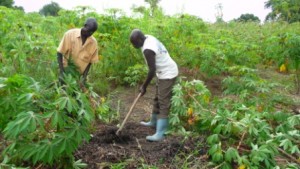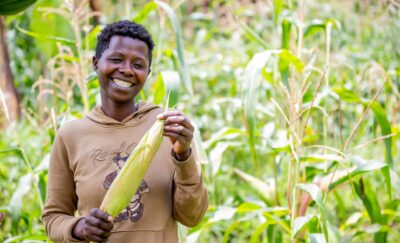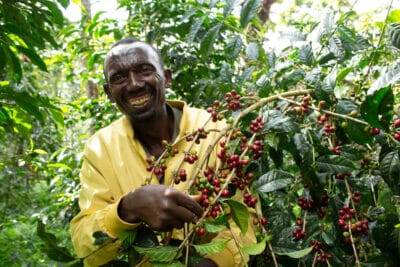News
9 January 2012
Turning farmers into businessmen in South Sudan

In 2010 Farm Africa launched a project to help farmers in South Sudan grow and sell more of the local staple crop, cassava.
Our project is designed to achieve far more than simply help farmers to grow more food. The main aim of Farm Africa’s Cassava Project is to help farmers produce consistently higher yields so that cassava surpluses can be sold at local markets. As more and more cassava is grown and sold by the farmers, so they can earn much needed extra income.
Ultimately, this extra income can be ploughed back into smallholdings so that farms become long-term businesses capable of generating sustained, long-term income and employment opportunities.
To ensure that farmers develop the commercial skills necessary to make the project a success, Farm Africa is running the project in partnership with the South African brewing multinational, SABMiller.
SABMiller is playing a vital role in the project by providing a guaranteed market for the farmers’ cassava. The company buys cassava from the farmers before extracting the starch which is then used to brew beer at SABMiller’s operation in Juba.
In addition, surpluses not sold to SABMiller are sold to local markets.
As a result of Farm Africa’s innovative teaming up with the private sector, the cassava grown by South Sudan’s farmers has been transformed from a subsistence crop into a commercially viable cash crop.
And with this change comes another: the transformation of South Sudan’s smallholders from subsistence farmers into local businessmen and entrepeneurs, capable of delivering our vision of a prosperous rural Africa.
Development of business skills
While SABMiller has been instrumental in providing investment and a secure market for cassava, Farm Africa has been busy training the farmers in a range of skills they will need to make a success of their new businesses.
Specifically, Farm Africa is working to strengthen the business and finance skills of farmers with an emphasis on collective marketing. We have worked recently to link up individual farmers into collective groups. Our experience tells us that when farmers market their produce collectively, they have greater negotiating power and are able to obtain higher prices at market.
We are therefore putting our farmers groups through training workshops designed to enhance cohesion and group dynamics. All groups involved in the project are now holding regular meetings with planned activities. These may include focusing on developing skills in book keeping and setting up of clear records of all sales.
We are also training farmers in the importance of producing high-quality cassava capable of meeting the demanding requirements of the market. Crucial to producing high-quality cassava is regular weeding and consistent spacing when sowing cassava. All eleven farmers groups involved in the Farm Africa project have now been trained in these techniques.
As a result they are now able to grow increased quantities of higher quality cassava. This is important not only because it generates more food in the form of tubers. Cassava stems can also be used as cuttings which farmers can either plant to grow more food, or sell on along with their surplus tubers to earn additional income to meet school, medical and household expenses.
Farmers groups are also serving as a useful forum for sharing information and increasing collective knowledge on potential threats to cassava growing. These include water-logging and termite attacks.
Read our report on a talk given recently at the Clinton Global Initiative by Farm Africa’s CEO Nigel Harris. The talk focused on the importance of private sector investment in development and our partnership with SABMiller.




